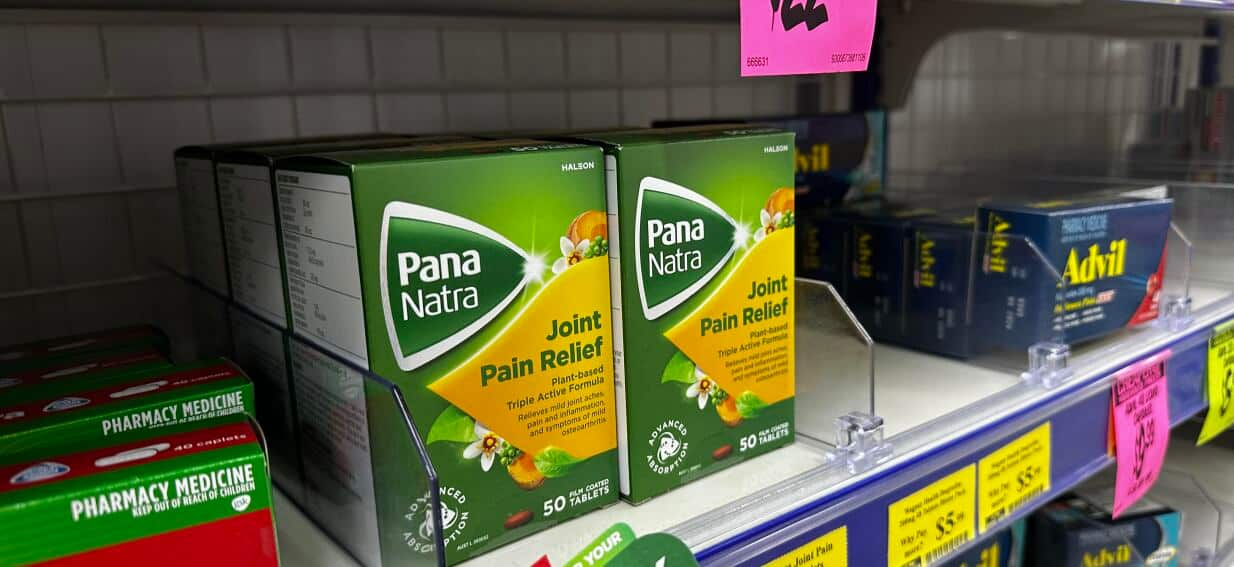Key Points
- A new “natural” painkiller is now available to buy in Australia.
- Some experts have questioned its efficacy.
- Here’s what you need to know.
There’s a new so-called painkiller on pharmacy and supermarket shelves, but experts have doubts about its efficacy and warn it still comes with risks despite its “natural” claims.
Haleon, the company behind Panadol, recently launched PanaNatra, a line of non-paracetamol-based pain relief medication. The three products, which they describe as “plant-based”, claim, respectively, to induce sleep and relieve pain, relieve muscle pain, and relieve joint pain.
A pack of 30 capsules at one major pharmacy will set you back about $14, while a box of 50 costs around $20.
Ian Musgrave, a molecular pharmacologist and lecturer at the University of Adelaide, has concerns about the efficacy of the range.
When a product is registered with the Therapeutic Goods Administration (TGA), it can be granted an “AUSTR” or “AUSTL” rating. The TGA says the former is given to higher-risk products where the company has provided “safety, quality, and efficacy data”. The latter — which applies to the PanaNatra products — is considered low-risk and does not require companies to submit evidence showing the product works as claimed.
“AUSTL basically indicates that the TGA believes these products don’t have a lot of adverse effects but they don’t have very strong evidence behind them,” Dr Musgrave said.
Dr Musgrave said the clinical trial data that does exist for the active ingredients in these products was hit and miss.
Some had small sample sizes, while others found an ingredient may have benefits but at a dose considerably higher than would likely exist in PanaNatra capsules, he said.
“People taking these products might imagine what they’re getting is a capsule with ground-up plant in it,” he said.
“What they’re getting is an extract … it tells you it’s an extract on the packet, but it may not reflect materials that have been used in clinical trials.”
Geraldine Moses, an adjunct associate professor at the University of Queensland’s School of Pharmacy, is critical of pharmaceutical products that market themselves as being natural.
“These are pharmaceutical products that have been made in a factory … sometimes it’s a romantic notion of naturalness that people like, and they forget that it’s a medicine like any other medicine,” Dr Moses said.
“And like any other medicine, it might work, but it also has the potential for side effects and drug interactions.”
Two of the PanaNatra products contain curcumin — a component of turmeric — which the company claims, according to “various research”, can help relieve “mild symptoms of osteoarthritis, post-workout joint pain and fatigue”.
“Curcumin … does have a potential anti-inflammatory effect, but it’s fairly weak,” Dr Moses said.
“Studies have been done, but they’re of varying quality … generally they’ll state that consumers say it works sometimes, but the studies are inconclusive.”
Despite the TGA generally deeming AUSTL products as “relatively benign”, Dr Moses said some so-called natural ingredients do have potential side effects and drug interactions and companies were under “very little obligation” to warn of them.
PanaNatra products have warnings on the packaging that state they are not suitable for breastfeeding women, and tell consumers with pre-existing conditions and those taking other medications to speak to their doctor.
Elena Pintado, the senior marketing manager of pain relief at Haleon,
as saying there was growing consumer interest in “naturally derived pain relief options”.
In 2021, a wide-ranging University of Sydney-led review looked at how effective paracetamol was in treating 44 pain conditions and found it worked for just four: knee or hip osteoarthritis, tension headache, perineal pain after childbirth, and craniotomy.
SBS News contacted Haleon for comment.
This article contains general information only. For advice relating to your personal situation, see a qualified medical practitioner.







Write a comment
Your email address will not be published. Required fields are marked *